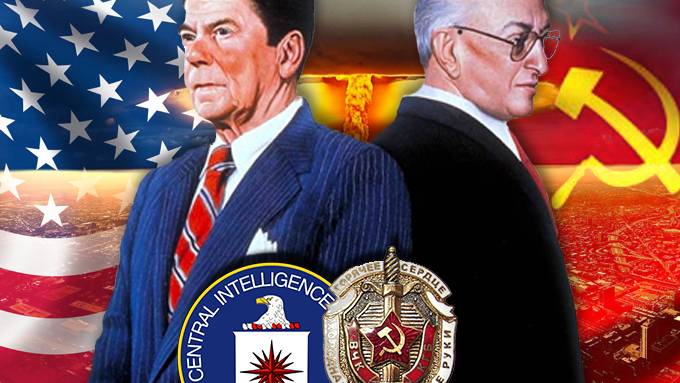KGB Spetsnaz & World War III
Source: espionagehistoryarchive.com

On the drizzly autumn Friday of November 11th, 1983, US President Ronald Reagan would have no time for his customary Oval Office nap. Besides delivering a speech that morning to the American Legion in honor of Veterans Day, Reagan then filled the rest of his schedule taking part in a NATO nuclear war exercise under the designation Able Archer. The president found the subject matter fascinating but frightening; despite his firebrand speeches, he also hoped the Soviets understood they had nothing to fear from America. His hope was in vain.
In Moscow, General Secretary Yuri Andropov saw Reagan’s role in Able Archer, underscored by America’s recent invasion of Grenada and a worldwide security alert of US forces, as the cover for a nuclear first strike. Escorted early after a freezing sunrise along with chief of the General Staff Marshal Nikolai Ogarkov to the Politburo’s subterranean command bunker by his elite KGB troops, with crushing sadness and dread Andropov transmitted his directive, a desperate attempt to minimize the looming devastation his country faced.
Later that evening, the NATO exercises having concluded, Reagan conferred with National Security Advisor Bud McFarlane, ate dinner, and set out with his wife Nancy for Andrews Air Force Base to begin his long trip to Japan. Marine One happened to pass over a wholly ordinary US Air Force Jeep on the highway below as the chopper made its approach to Andrews. Inside that Jeep were four airmen in the smart blue berets of the Air Force Security Police, the sergeant speaking with a southern Illinois accent, though he had grown up in Khabarovsk. The group had transited the Canadian border a week prior, having been directed to a safe house in a suburb of Washington, DC, to await orders. Their orders were in: under the guise of a Security Police patrol and with the right documents and no questions asked, they managed to enter Andrews, filter through layers of security and conceal a device the size of a large briefcase, to be activated by satellite signal, in some brush opposite the tarmac an hour before the president’s arrival.
Reagan, greeted at Air Force One for a short debriefing on Able Archer by Secretary of Defense Cap Weinberger and Chairman of the Joint Chiefs John Vessey, was looking forward to being the first American president to address Japan’s parliament, the Diet. Yet the day would never come – the pouring rain simply evaporated as a fireball of hellish intensity rose up to incinerate Andrews Air Force Base.
The four airmen in the Jeep, on their way southward into Virginia, witnessed the terrible flash illuminate the night sky behind them. Here and across the Atlantic, other groups, heretofore invisible, were descending like packs of wolves upon their targets. Speaking little amongst themselves while checking their weapons, they raced down I-95 toward their next objective in darkness: the power grid of the whole eastern seaboard had just gone dead.
Such a horrific turn of events was more likely than we would care to consider. Thankfully, Reagan decided not to participate in Able Archer and rather went straight to Japan to address the Diet. Andropov and the Soviet leadership, while on razor’s edge over what they viewed as provocative US-NATO moves, didn’t overreact. Instead of this nightmare scenario coming true, East and West would live to tell of another narrow escape from Armageddon during the dark days of the Cold War. Yet the armed services and spies of both sides would continue to stand at the ready for any eventuality – the following is the true story of the KGB’s special units.
The KGB – Instrument of Soviet Global Power
From the mid-1970s to the 1980s, the Soviet KGB created a fearsome capability for counter-terrorism and special operations, one that made Western strategists nervously re-evaluate their plans and projections. With the potential for conflict with the United States and NATO – from the risk of nuclear exchange to brushfire wars in the Third World – only growing, such dangerous circumstances required the creation of special units distinct from those of the General Staff’s GRU (Glavnoe Razvedyvatel’noe Upravlenie– Main Intelligence Directorate).
[...]
Read the rest: espionagehistoryarchive.com






















